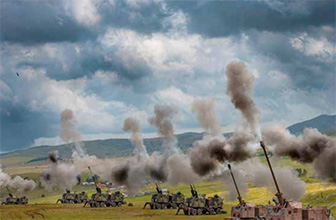Publications
Revolutionizing the Turkish Army under Erdogan  By Yeghia TASHJIAN, Beirut-based regional analyst and researcher, columnist, "The Armenian Weekly”
By Yeghia TASHJIAN, Beirut-based regional analyst and researcher, columnist, "The Armenian Weekly”
Back in July, Rich Outzen published a policy paper “Deals, Drones and National Will: The New Era in Turkish Power Projection” in the Washington Institute for Near East Policy highlighting the new strategy of the Turkish Armed Forces, the development of the arms industry and how Ankara is deploying hard power in the region. According to Outzen, the integration of drones, electronic warfare, manoeuvre and precision strike employed by Turkey across technologies and domains (manned/unmanned and ground/air/naval) have been characterized as a new phase of a revolution in military affairs (RMA). An RMA is a hypothesis in military theory about the future of warfare, often connected to technological and organizational recommendations for radical military reform. An RMA occurs when new tactics, technologies and operational concepts enable dramatic increases in ineffectiveness to provide early innovators a marked advantage and force others to adopt the same methods. READ MORE
Publications
Assessing Armenians’ Geopolitical Situation  By Alan Whitehorn, Professor Emeritus in Political Science, The Royal Military College of Canada
By Alan Whitehorn, Professor Emeritus in Political Science, The Royal Military College of Canada
Armenia is at yet another critical time. The war losses were substantial and impacted greatly. Violent Azerbaijani-Armenian border incidents continue, with property damage, military personnel injuries and deaths. The risks ahead are significant. Accordingly, it is crucial to assess the geopolitical situation that confronts Armenia, commencing first with key problems and challenges and then exploring some opportunities.
Amongst the pressing issues is the fact that demographically Armenia has far less manpower than Azerbaijan, even if women were conscripted too. Armenia’s population has been declining significantly due to outmigration and this pattern has been accelerating after the recent Karabakh war and various phases of the Covid pandemic. An army historically based on conscription needs to address its critical declining population base. READ MORE
Publications
Armenia’s Five Stages of Grief  By Benyamin Poghosyan, PhD, Chairman, Center for Political and Economic Strategic Studies
By Benyamin Poghosyan, PhD, Chairman, Center for Political and Economic Strategic Studies
Todd Fabacher, Co-Founder, Distrikt Foundation, Gyumri
Countries, just like people, will experience the five stages of grief after a significant loss. 2020 was a challenging year for all nations. COVID – 19 pandemic and economic downturn have negatively impacted almost everyone. It was an exceptionally difficult year for Armenia because, besides the pandemic, defeat in the war launched by Azerbaijan against the unrecognized Nagorno Karabakh (Artsakh) Republic in autumn 2020 resulted in significant material and human losses. In the first half of 2021, Armenia grasped domestic political instability, triggering an early parliamentary election in June 2021. READ MORE
Publications
Assessing the Current Situation in the South Caucasus  By Alan Whitehorn, Professor Emeritus in Political Science, The Royal Military College of Canada
By Alan Whitehorn, Professor Emeritus in Political Science, The Royal Military College of Canada
Despite signing the November 9, 2020 ceasefire, Azerbaijan and Armenia have not been able to agree on an actual firm ceasefire. There are too many border incursions and military incidents, despite the existence of decades-old soviet boundaries between republics that were firmly regulated in the former Soviet Union. Peacekeepers are too few and not located in enough areas to address all of the border incidents. READ MORE
Publications
Military Aerospace Expertise and Exports from Israel  By Eugene Kogan, Tbilisi-based defence and security expert
By Eugene Kogan, Tbilisi-based defence and security expert
Local domestic military aerospace expertise has been honed over a period of almost 60 years. Israel’s procurement of US-built fighter aircraft and Israeli technicians and aeronautical engineers developing subsystems and avionics for the jets has enhanced their skills and expertise.
Rafael Advanced Defence Systems’ cooperation with Raytheon has taken military aerospace expertise to the next level. The triple combination of buying from the United States, developing subsystems locally, and teaming up with the US has contributed to successful arms exports from Israel. The Ministry of Defence International Defence Cooperation Authority (known as SIBAT) realised in November 2019 that the international arms market was undergoing serious changes and certain adjustments would be needed in order to remain competitive and increase the market share of Israeli defence companies. READ MORE.
Publications
Israeli-Greek Naval, Air Force and Defence Industry Cooperation  By Eugene Kogan, Tbilisi-based defence and security expert
By Eugene Kogan, Tbilisi-based defence and security expert
The bilateral Israeli-Greek military and defence industry cooperation was not created in a vacuum, but is a by-product of the steadily deteriorating Israeli-Turkish relations which include two important events: the famous World Economic Forum incident in Davos on January 29th, 2009 and the Mavi Marmara incident on May 31st, 2010. The Davos incident was further aggravated by the Mavi Marmara incident, which left ten Turkish citizens dead after clashing with Israeli commandos as the latter boarded the ship which was trying to break the Gaza blockade. Moreover, the military component of Israeli-Turkish relations, which used to be the backbone of the relations, is still missing and is unlikely to reappear in the near future. READ MORE.